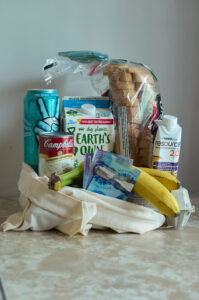With grocery costs soaring through the roof and price gouging sneaking up around every corner, it’s getting harder and harder to live on the budget of a student. But there are some tips and tricks that can help decrease food waste and make groceries last longer in the fridge.
One way to reduce food costs is to know the difference between an expiration date and a best before date.
An expiration date is printed on food products that are unsafe to eat and pose health risks if consumed past the specified date. There are only five types of foods that Health Canada requires true expiration dates on—baby formula, meal replacements or supplement bars, meal replacement drinks, formulated liquid diets, and foods used in low-energy diets (sold and prescribed by physicians only). If purchasing these products, be aware of the expiration dates and discard if not consumed before the printed date.

Best before dates are only required on products that stay fresh for 90 days or less and is the recommended date a product should be eaten by. After the best before date, the item could lose some of its flavour or nutritional value—but, if stored correctly, may still be safe to eat. Manufacturers often use best before dates on products that last longer than 90 days as their recommended date for optimal freshness and taste even though it’s not required.
Save cents by using your senses. Look for mould or an unusual texture. Smell the product and discard if it smells bad. As meat spoils, it becomes discoloured—for example, chicken changes from a pinkish colour to a dull grey or yellow. It can also have a slimy film on it. Fish with a strong fishy smell should be discarded. We want to reduce food waste and save money, but also it’s good to sometimes remember “when in doubt, throw out” as it’s better to be safe than sick.
Meat, poultry, fish, and dairy products are the most dangerous foods as when they approach and pass their best before date, they can easily encourage the growth of bacteria that causes foodborne illness. That being said, milk (including dairy alternatives), butter, yogurt, cheese, ice cream, and sour cream that is unopened and stored correctly may still be good up to two weeks past the best before date. Check it before you chuck it.
Stocking the pantry and freezer with long-lasting food items when student loans come in can be handy toward the end of semester. Frozen dinners, microwaveable meals, and shelf-stable canned soups and stews will last up to a year past the best before date. Beverages such as bottled water, coconut water, coffee, tea, and sport or energy drinks will last three to six months past the best before date. However, never eat anything from a dented or bulging can, as it could be contaminated with bacteria.
Storing foods correctly will help make them last longer. Having a fridge thermometer will help ensure it stays at the optimal temperature. Look for any damage to packaging, and if necessary, place in an airtight container.
Shopping with flyers and buying in bulk is another way to help keep food costs down. A handy app that you can use to shop from all flyers at one time is Flipp—it has an option to save favourite flyers for easy reference.
Most grocery stores start their weekly sales on Thursdays. Save-On-Foods occasionally has $1.49 days. Buying cases of frequently consumed products such as drinks or canned vegetables can be cheaper than buying them individually. Wholesale store Costco does require a membership, however, Wholesale Club doesn’t.
Making a meal plan before shopping can also lower food waste. Meal plans also help in planning which days to cook so there are leftovers for busier days in the week or lunches at school.
